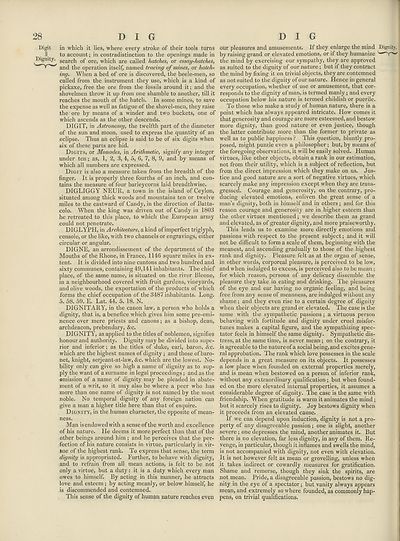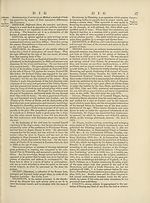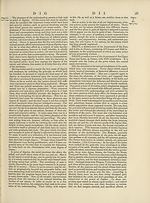Encyclopaedia Britannica > Volume 8, DIA-England
(38) Page 28
Download files
Complete book:
Individual page:
Thumbnail gallery: Grid view | List view

1
28
DIG
D I G
Digit in which it lies, where every stroke of their tools turns
II. to account; in contradistinction to the openings made in
Dignity. search 0f
ore, which are called hatches, or essay-hatches,
an(j the operation itself, named tracing of mines, or hatch¬
ing. When a bed of ore is discovered, the beele-men, so
called from the instrument they use, which is a kind of
pickaxe, free the ore from the fossils around it; and the
shovelmen throw it up from one shamble to another, till it
reaches the mouth of the hatch. In some mines, to save
the expense as well as fatigue of the shovel-men, they raise
the ore by means of a winder and two buckets, one of
which ascends as the other descends.
DIGIT, in Astronomy, the twelfth part of the diameter
of the sun and moon, used to express the quantity of an
eclipse. Thus an eclipse is said to be of six digits when
six of these parts are hid.
Digits, or Monades, in Arithmetic, signify any integer
under ten; as, 1, 2, 3, 4, 5, 6, 7, 8, 9, and by means of
which all numbers are expressed.
Digit is also a measure taken from the breadth of the
finger. It is properly three fourths of an inch, and con¬
tains the measure of four barleycorns laid breadthwise.
DIGLIGGY NEUR, a town in the island of Ceylon,
situated among thick woods and mountains ten or twelve
miles to the eastward of Candy, in the direction of Batta-
colo. When the king was driven out of Candy in 1803
he retreated to this place, to which the European army
could not penetrate.
DIGLYPH, in Architecture, a kind of imperfect triglyph,
console, or the like, with two channels or engravings, either
circular or angular.
DIGNE, an arrondissement of the department of the
Mouths of the Rhone, in France, 1146 square miles in ex¬
tent. It is divided into nine cantons and two hundred and
sixty communes, containing 49,141 inhabitants. The chief
place, of the same name, is situated on the river Bleone,
in a neighbourhood covered with fruit gardens, vineyards,
and olive woods, the exportation of the products of which
forms the chief occupation of the 3487 inhabitants. Long.
5. 58. 59. E. Lat. 44. 5. 18. N.
DIGNITARY, in the canon law, a person who holds a
dignity, that is, a benefice which gives him some pre-emi¬
nence over mere priests and canons; as a bishop, dean,
archdeacon, prebendary, &c.
DIGNITY, as applied to the titles of noblemen, signifies
honour and authority. Dignity may be divided into supe¬
rior and inferior; as the titles of duke, earl, baron, &c.
which are the highest names of dignity; and those of baro¬
net, knight, serjeant-at-law, &c. which are the lowest. No¬
bility only can give so high a name of dignity as to sup¬
ply the want of a surname in legal proceedings; and as the
omission of a name of dignity may be pleaded in abate¬
ment of a writ, so it may also be where a peer who has
more than one name of dignity is not named by the most
noble. No temporal dignity of any foreign nation can
give a man a higher title here than that of esquire.
Dignity, in the human character, the opposite of mean¬
ness.
Man is endowed with a sense of the worth and excellence
of his nature. He deems it more perfect than that of the
other beings around him ; and he perceives that the per¬
fection of his nature consists in virtue, particularly in vir¬
tue of the highest rank. To express that sense, the term
dignity is appropriated. Further, to behave with dignity,
and to refrain from all mean actions, is felt to be not
only a virtue, but a duty: it is a duty which every man
owes to himself. By acting in this manner, he attracts
love and esteem; by acting meanly, or below himself, he
is discommended and contemned.
This sense of the dignity of human nature reaches even
our pleasures and amusements. If they enlarge the mind Dignity,
by raising grand or elevated emotions, or if they humanize
the mind by exercising our sympathy, they are approved
as suited to the dignity of our nature ; but if they contract
the mind by fixing it on trivial objects, they are contemned
as not suited to the dignity of our nature. Hence in general
every occupation, whether of use or amusement, that cor¬
responds to the dignity of man, is termed manly; and every
occupation below his nature is termed childish or puerile.
To those who make a study of human nature, there is a
point which has always appeared intricate. How comes it
that generosity and courage are more esteemed, and bestow
more dignity, than good nature or even justice, though
the latter contribute more than the former to private as
well as to public happiness ? This question, bluntly pro¬
posed, might puzzle even a philosopher; but, by means of
the foregoing observations, it will be easily solved. Human
virtues, like other objects, obtain a rank in our estimation,
not from their utility, which is a subject of reflection, but
from the direct impression which they make on us. Jus¬
tice and good nature are a sort of negative virtues, which
scarcely make any impression except when they are trans¬
gressed. Courage and generosity, on the contrary, pro¬
ducing elevated emotions, enliven the great sense of a
man’s dignity, both in himself and in others; and for this
reason courage and generosity are in higher esteem than
the other virtues mentioned; we describe them as grand
and elevated, as of greater dignity, and more praiseworthy.
This leads us to examine more directly emotions and
passions with respect to the present subject; and it will
not be difficult to forma scale of them, beginning with the
meanest, and ascending gradually to those of the highest
rank and dignity. Pleasure felt as at the organ of sense,
in other words, corporeal pleasure, is perceived to be low,
and when indulged to excess, is perceived also to be mean ;
for which reason, persons of any delicacy dissemble the
pleasure they take in eating and drinking. The pleasures
of the eye and ear having no organic feeling, and being
free from any sense of meanness, are indulged without any
shame; and they even rise to a certain degree of dignity
when their objects are grand or elevated. The case is the
same with the sympathetic passions; a virtuous person
behaving with fortitude and dignity under cruel misfor¬
tunes makes a capital figure, and the sympathizing spec¬
tator feels in himself the same dignity. Sympathetic dis¬
tress, at the same time, is never mean; on the contrary, it
is agreeable to the natureof a social being, and excites gene¬
ral approbation. The rank which love possesses in the scale
depends in a great measure on its objects. It possesses
a low place when founded on external properties merely,
and is mean when bestowed on a person of inferior rank,
without any extraordinary qualification ; but when found¬
ed on the more elevated internal properties, it assumes a
considerable degree of dignity. The case is the same with
friendship. When gratitude is warm it animates the mind;
but it scarcely rises to dignity. Joy bestows dignity when
it proceeds from an elevated cause.
If we can depend upon induction, dignity is not a pro¬
perty of any disagreeable passion; one is slight, another
severe; one depresses the mind, another animates it. But
there is no elevation, far less dignity, in any of them. Re¬
venge, in particular, though it inflames and swells the mind,
is not accompanied with dignity, not even with elevation.
It is not however felt as mean or grovelling, unless when
it takes indirect or cowardly measures for gratification.
Shame and remorse, though they sink the spirits, are
not mean. Pride, a disagreeable passion, bestows no dig¬
nity in the eye of a spectator; but vanity always appears
mean, and extremely so where founded, as commonly hap¬
pens, on trivial qualifications.
28
DIG
D I G
Digit in which it lies, where every stroke of their tools turns
II. to account; in contradistinction to the openings made in
Dignity. search 0f
ore, which are called hatches, or essay-hatches,
an(j the operation itself, named tracing of mines, or hatch¬
ing. When a bed of ore is discovered, the beele-men, so
called from the instrument they use, which is a kind of
pickaxe, free the ore from the fossils around it; and the
shovelmen throw it up from one shamble to another, till it
reaches the mouth of the hatch. In some mines, to save
the expense as well as fatigue of the shovel-men, they raise
the ore by means of a winder and two buckets, one of
which ascends as the other descends.
DIGIT, in Astronomy, the twelfth part of the diameter
of the sun and moon, used to express the quantity of an
eclipse. Thus an eclipse is said to be of six digits when
six of these parts are hid.
Digits, or Monades, in Arithmetic, signify any integer
under ten; as, 1, 2, 3, 4, 5, 6, 7, 8, 9, and by means of
which all numbers are expressed.
Digit is also a measure taken from the breadth of the
finger. It is properly three fourths of an inch, and con¬
tains the measure of four barleycorns laid breadthwise.
DIGLIGGY NEUR, a town in the island of Ceylon,
situated among thick woods and mountains ten or twelve
miles to the eastward of Candy, in the direction of Batta-
colo. When the king was driven out of Candy in 1803
he retreated to this place, to which the European army
could not penetrate.
DIGLYPH, in Architecture, a kind of imperfect triglyph,
console, or the like, with two channels or engravings, either
circular or angular.
DIGNE, an arrondissement of the department of the
Mouths of the Rhone, in France, 1146 square miles in ex¬
tent. It is divided into nine cantons and two hundred and
sixty communes, containing 49,141 inhabitants. The chief
place, of the same name, is situated on the river Bleone,
in a neighbourhood covered with fruit gardens, vineyards,
and olive woods, the exportation of the products of which
forms the chief occupation of the 3487 inhabitants. Long.
5. 58. 59. E. Lat. 44. 5. 18. N.
DIGNITARY, in the canon law, a person who holds a
dignity, that is, a benefice which gives him some pre-emi¬
nence over mere priests and canons; as a bishop, dean,
archdeacon, prebendary, &c.
DIGNITY, as applied to the titles of noblemen, signifies
honour and authority. Dignity may be divided into supe¬
rior and inferior; as the titles of duke, earl, baron, &c.
which are the highest names of dignity; and those of baro¬
net, knight, serjeant-at-law, &c. which are the lowest. No¬
bility only can give so high a name of dignity as to sup¬
ply the want of a surname in legal proceedings; and as the
omission of a name of dignity may be pleaded in abate¬
ment of a writ, so it may also be where a peer who has
more than one name of dignity is not named by the most
noble. No temporal dignity of any foreign nation can
give a man a higher title here than that of esquire.
Dignity, in the human character, the opposite of mean¬
ness.
Man is endowed with a sense of the worth and excellence
of his nature. He deems it more perfect than that of the
other beings around him ; and he perceives that the per¬
fection of his nature consists in virtue, particularly in vir¬
tue of the highest rank. To express that sense, the term
dignity is appropriated. Further, to behave with dignity,
and to refrain from all mean actions, is felt to be not
only a virtue, but a duty: it is a duty which every man
owes to himself. By acting in this manner, he attracts
love and esteem; by acting meanly, or below himself, he
is discommended and contemned.
This sense of the dignity of human nature reaches even
our pleasures and amusements. If they enlarge the mind Dignity,
by raising grand or elevated emotions, or if they humanize
the mind by exercising our sympathy, they are approved
as suited to the dignity of our nature ; but if they contract
the mind by fixing it on trivial objects, they are contemned
as not suited to the dignity of our nature. Hence in general
every occupation, whether of use or amusement, that cor¬
responds to the dignity of man, is termed manly; and every
occupation below his nature is termed childish or puerile.
To those who make a study of human nature, there is a
point which has always appeared intricate. How comes it
that generosity and courage are more esteemed, and bestow
more dignity, than good nature or even justice, though
the latter contribute more than the former to private as
well as to public happiness ? This question, bluntly pro¬
posed, might puzzle even a philosopher; but, by means of
the foregoing observations, it will be easily solved. Human
virtues, like other objects, obtain a rank in our estimation,
not from their utility, which is a subject of reflection, but
from the direct impression which they make on us. Jus¬
tice and good nature are a sort of negative virtues, which
scarcely make any impression except when they are trans¬
gressed. Courage and generosity, on the contrary, pro¬
ducing elevated emotions, enliven the great sense of a
man’s dignity, both in himself and in others; and for this
reason courage and generosity are in higher esteem than
the other virtues mentioned; we describe them as grand
and elevated, as of greater dignity, and more praiseworthy.
This leads us to examine more directly emotions and
passions with respect to the present subject; and it will
not be difficult to forma scale of them, beginning with the
meanest, and ascending gradually to those of the highest
rank and dignity. Pleasure felt as at the organ of sense,
in other words, corporeal pleasure, is perceived to be low,
and when indulged to excess, is perceived also to be mean ;
for which reason, persons of any delicacy dissemble the
pleasure they take in eating and drinking. The pleasures
of the eye and ear having no organic feeling, and being
free from any sense of meanness, are indulged without any
shame; and they even rise to a certain degree of dignity
when their objects are grand or elevated. The case is the
same with the sympathetic passions; a virtuous person
behaving with fortitude and dignity under cruel misfor¬
tunes makes a capital figure, and the sympathizing spec¬
tator feels in himself the same dignity. Sympathetic dis¬
tress, at the same time, is never mean; on the contrary, it
is agreeable to the natureof a social being, and excites gene¬
ral approbation. The rank which love possesses in the scale
depends in a great measure on its objects. It possesses
a low place when founded on external properties merely,
and is mean when bestowed on a person of inferior rank,
without any extraordinary qualification ; but when found¬
ed on the more elevated internal properties, it assumes a
considerable degree of dignity. The case is the same with
friendship. When gratitude is warm it animates the mind;
but it scarcely rises to dignity. Joy bestows dignity when
it proceeds from an elevated cause.
If we can depend upon induction, dignity is not a pro¬
perty of any disagreeable passion; one is slight, another
severe; one depresses the mind, another animates it. But
there is no elevation, far less dignity, in any of them. Re¬
venge, in particular, though it inflames and swells the mind,
is not accompanied with dignity, not even with elevation.
It is not however felt as mean or grovelling, unless when
it takes indirect or cowardly measures for gratification.
Shame and remorse, though they sink the spirits, are
not mean. Pride, a disagreeable passion, bestows no dig¬
nity in the eye of a spectator; but vanity always appears
mean, and extremely so where founded, as commonly hap¬
pens, on trivial qualifications.
Set display mode to:
![]() Universal Viewer |
Universal Viewer | ![]() Mirador |
Large image | Transcription
Mirador |
Large image | Transcription
Images and transcriptions on this page, including medium image downloads, may be used under the Creative Commons Attribution 4.0 International Licence unless otherwise stated. ![]()
| Encyclopaedia Britannica > Encyclopaedia Britannica > Volume 8, DIA-England > (38) Page 28 |
|---|
| Permanent URL | https://digital.nls.uk/193323499 |
|---|
| Attribution and copyright: |
|
|---|
| Description | Ten editions of 'Encyclopaedia Britannica', issued from 1768-1903, in 231 volumes. Originally issued in 100 weekly parts (3 volumes) between 1768 and 1771 by publishers: Colin Macfarquhar and Andrew Bell (Edinburgh); editor: William Smellie: engraver: Andrew Bell. Expanded editions in the 19th century featured more volumes and contributions from leading experts in their fields. Managed and published in Edinburgh up to the 9th edition (25 volumes, from 1875-1889); the 10th edition (1902-1903) re-issued the 9th edition, with 11 supplementary volumes. |
|---|---|
| Additional NLS resources: |
|

